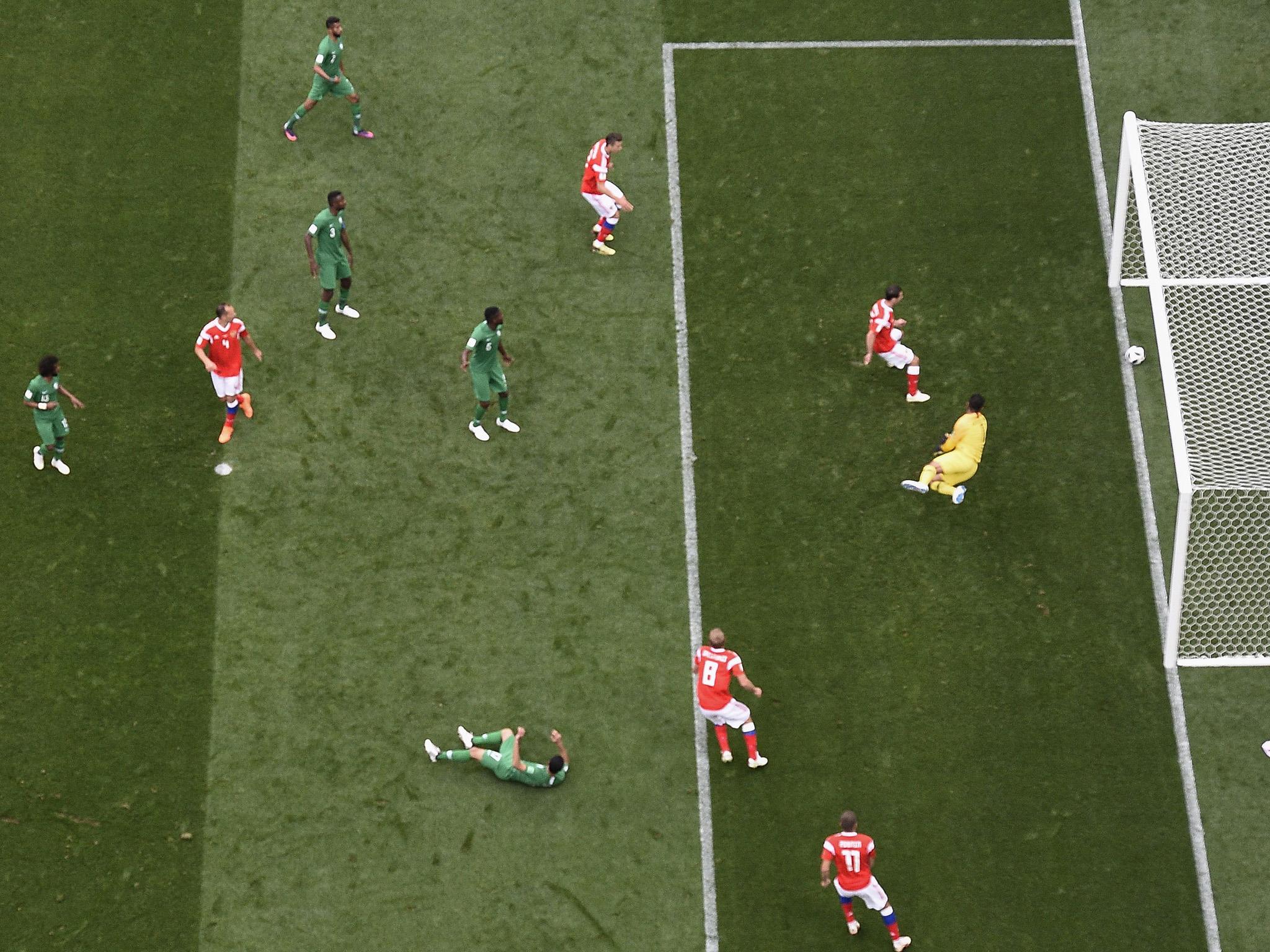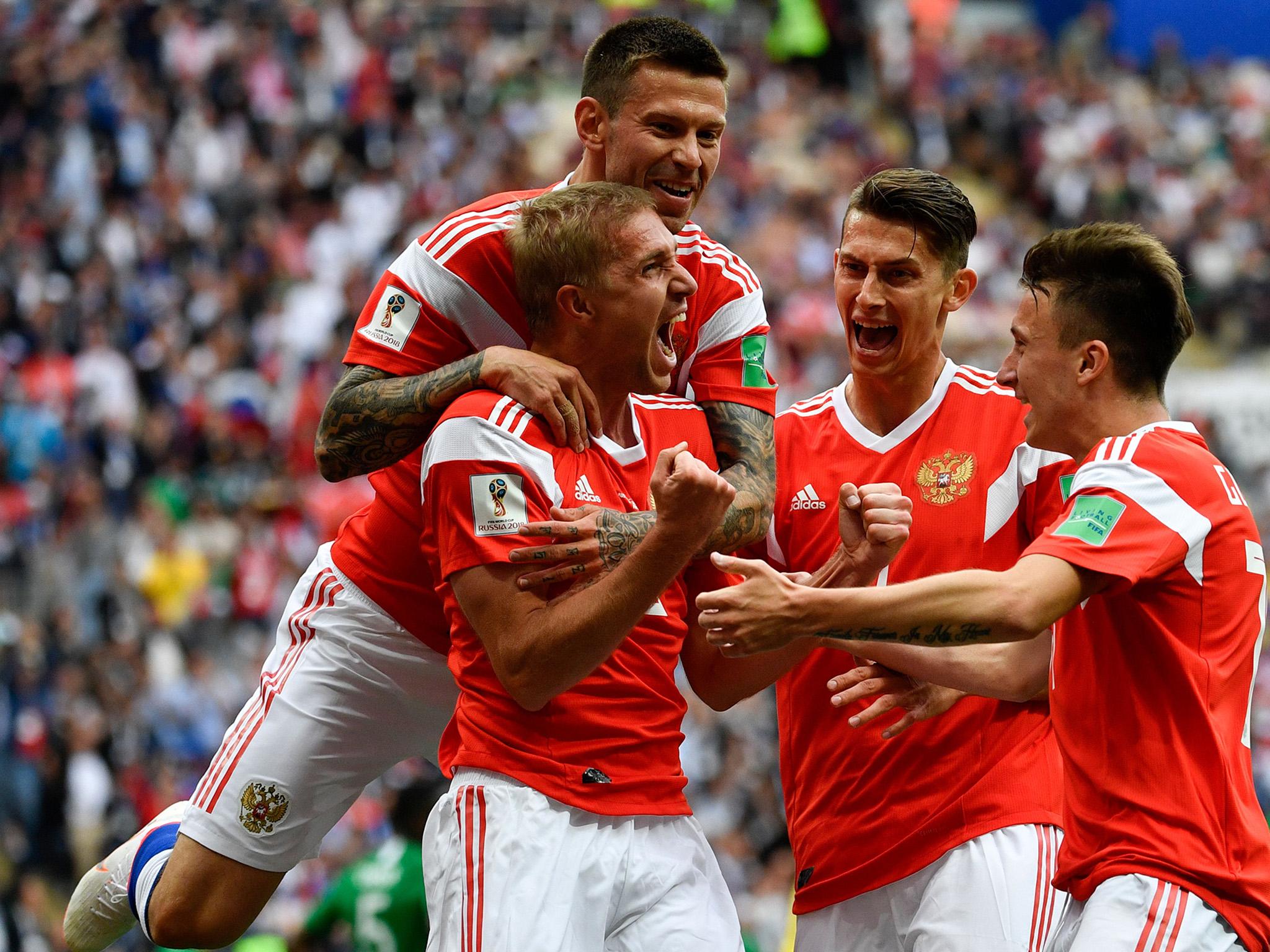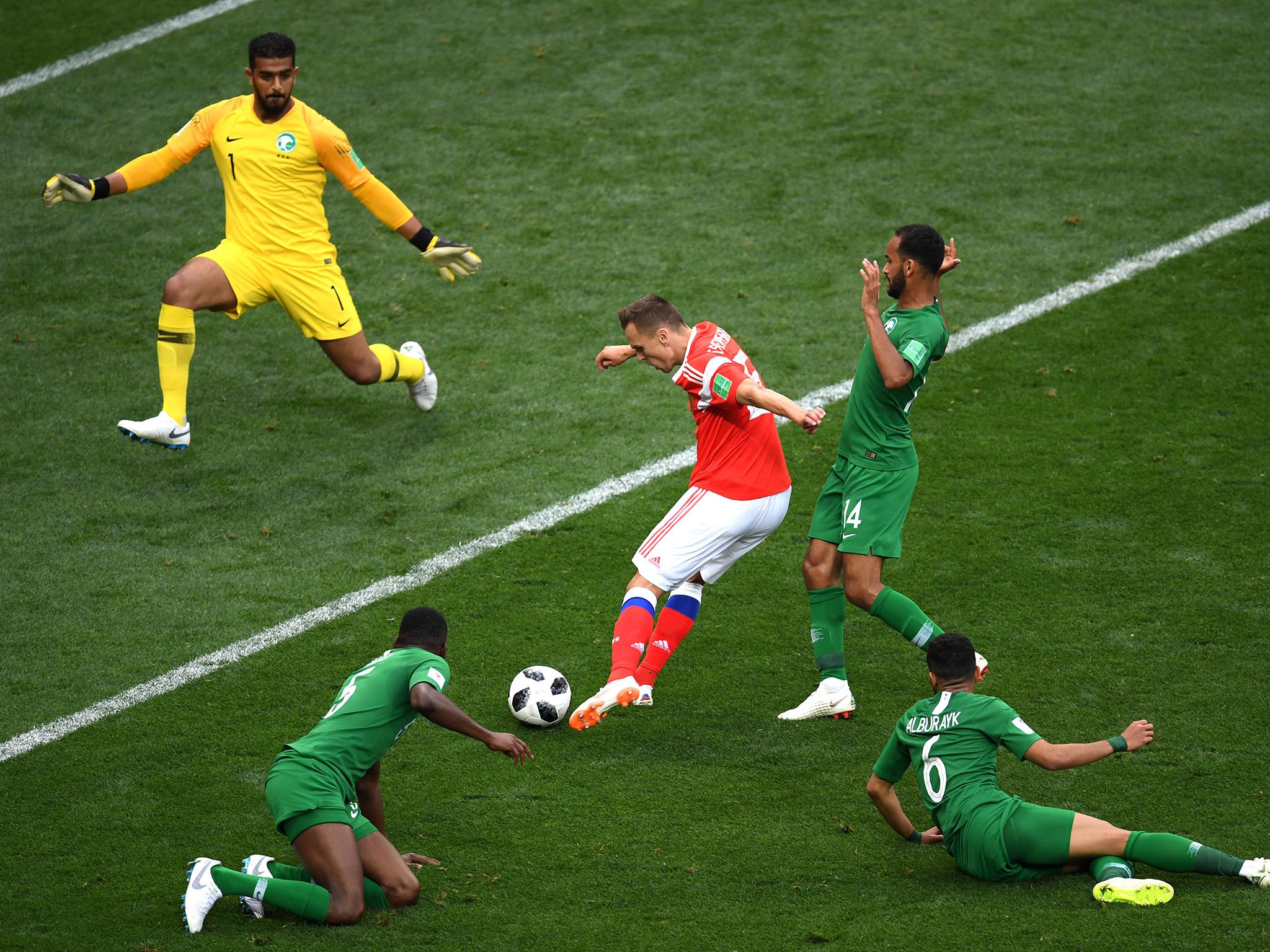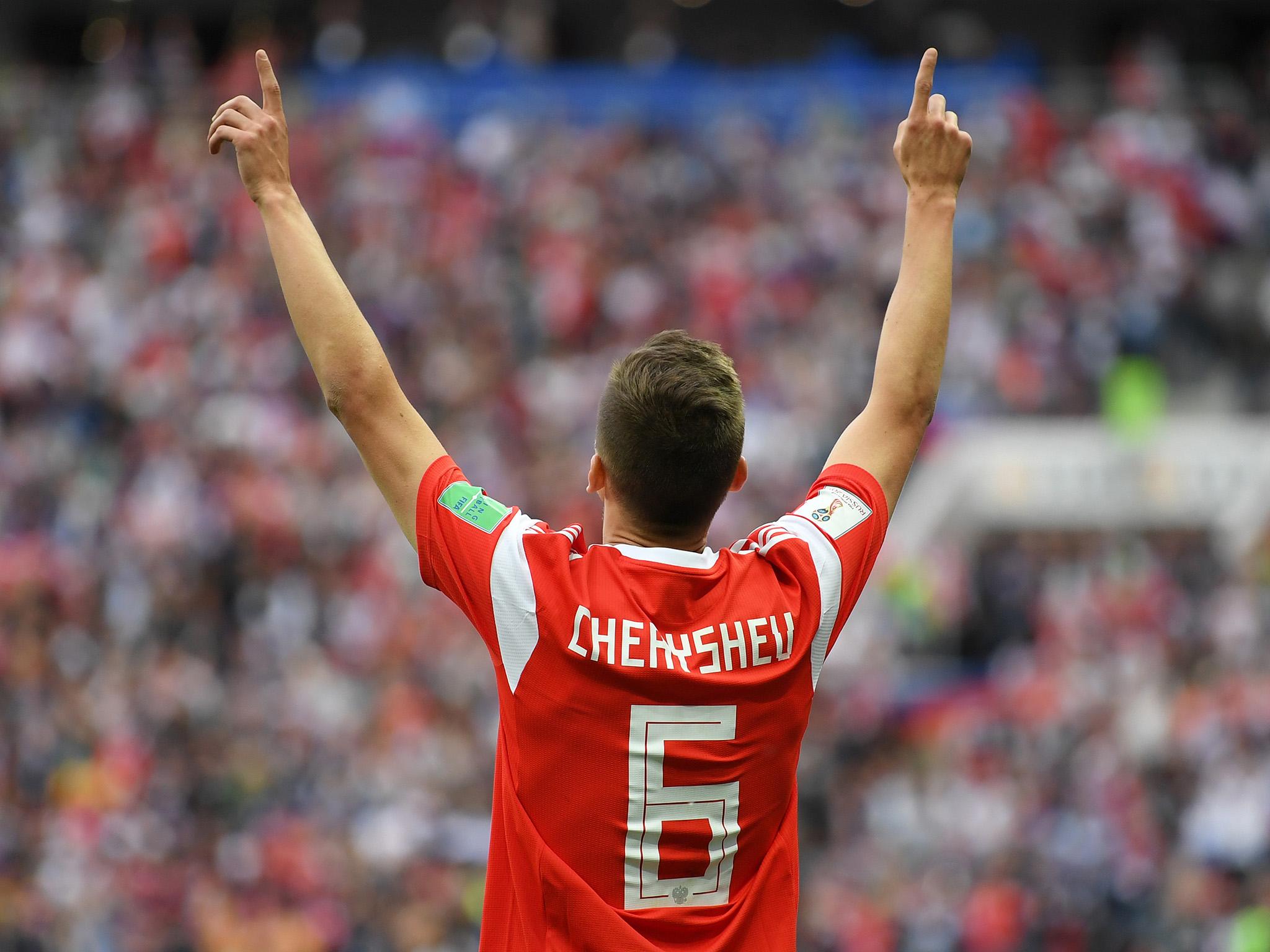World Cup 2018: Russia down Saudi Arabia as greatest show on earth starts as it means to go on
A match with so much mystery - and the hosts coming out on top - was the perfect start to a tournament we all have a lifelong infatuation with

Your support helps us to tell the story
From reproductive rights to climate change to Big Tech, The Independent is on the ground when the story is developing. Whether it's investigating the financials of Elon Musk's pro-Trump PAC or producing our latest documentary, 'The A Word', which shines a light on the American women fighting for reproductive rights, we know how important it is to parse out the facts from the messaging.
At such a critical moment in US history, we need reporters on the ground. Your donation allows us to keep sending journalists to speak to both sides of the story.
The Independent is trusted by Americans across the entire political spectrum. And unlike many other quality news outlets, we choose not to lock Americans out of our reporting and analysis with paywalls. We believe quality journalism should be available to everyone, paid for by those who can afford it.
Your support makes all the difference.Vladimir Putin took the opportunity of his speech at the World Cup opening ceremony to declare that Russia’s relationship with football, which began in 1897, had been “love at first sight.”
Watching this tournament’s opening game between the hosts and Saudi Arabia, it is fair to say that nobody would have been immediately enamoured with the sport - a low-quality, one-sided encounter between two of the competition’s worst sides - but there was the feeling of something far greater happening in the Russian capital as global football’s great carnival finally began.
To walk through Moscow on Thursday was to experience virtually all corners of the world.
Nikolskaya Street, the pedestrianised thoroughfare that links Lubyanka Square and Red Square, is bedecked with millions of dangling lights that glitter like stars at night. But it is not the stars of the football world who have descended on Russia that make this tournament what it is, this much is clear.
At a time of great global strife, of political questions that hurt and answers that might hurt even more, to spend one passing moment with the fans who have travelled thousands of miles to be here is a life-affirming experience. To listen to them sing, to watch as they wander the streets aimlessly and without a care in the world, yet all with the same desire, to watch their team play at the World Cup.
Because for most of them this is not even about winning.
Panamanians whose songs filled the streets near Red Square could not care less if their team doesn’t even muster a goal. “We have arrived” they sing, and arrive they have in incredible numbers. Peru, after 36 years, are well represented too. Egypt have waited since 1990 to be here and have brought their own Red Sea of shirts and flags to leave their mark. For Iceland it is a first time too.

And in a country that for vast periods of the last century has been an impregnable glacier to foreigners, a cold outpost of the diplomatic world, all comers are now being welcomed. Russia’s arms are wide open to travellers from around the globe and football is the vehicle for that.
That travelling element is important. In fact, it’s an essential pillar of what the World Cup is, of why people love it and what it represents. World Cups necessitate travel in the traditional sense; the logistical challenges of shipping 32 squads of players, coaches and hangers-on around countries while fans make the same journeys by land, air or sea. But World Cups also make us travel into the unknown and this opening game was a terrific example of that.
Football is a hyper-corporate beast now. A child in Bhutan or Guatemala can watch any game from one of the top European leagues with ease these days and it has helped grow the sport into an omnipresent super-economy of its own making. So rarely in the age of digital information will a fan be able to turn on a game in a top-tier football competition and not really have a clue who some of the players are or how the teams really match up.

But Russia vs Saudi Arabia was one of these games, and in many ways the perfect fixture to kick off a tournament like this. Realistically, only four or five teams have the quality to go all the way and win the World Cup and you already know their names. You already know the 23 names within those names, and the coach, and maybe even the physio.
But this was a match with so much mystery. Ilya Kutepov sounds just grand but few of the tens of millions of viewers around the world will know if he’s any good, ditto for Taiseer Ajassam starting in midfield for the Saudis.
Fans from far-flung corners of the globe tuned in and travelled 90 minutes through the unknown, picking up nuggets of information as they went, discovering that Aleksandr Golovin might be quite handy actually and that Mohammed Alburayk looks like he may well have only been on the pitch as a competition winner or perhaps part of one of those candid camera TV shows.

It was Golovin whose cross helped Russia open the scoring, profiting from Alburayk’s untimely slip for Iury Gazinsky to head home. That goal will be replayed across Russia for days, as will Denis Cheryshev’s thumping second, the result of increasing Russian dominance in the face of, let’s face it, fairly feeble opposition.
Gazinsky, bathed in late-afternoon sunlight, produced the technicolour moment that the host nation had been waiting for, his bright red shirt popping as he leapt and the deep green of the Luzhniki turf his canvas. With 99.9% of those consuming the World Cup doing so via television, every camera shot like that of Gazinsky is an instant memory, history recorded in the same image no matter where you are in the world.

It reminds you of Siphiwe Tshabalala’s “goal for all of Africa” or Papa Bouba Diop stunning France in 2002. Opening games produce ready-made nostalgia moments for future generations; those experiencing their first World Cup, those whose nations have never been here before or simply one of the billions in love with football.
The power of memory - a nostalgic time-travelling device that lodges old World Cup moments in the brain forever, resurfacing them every four years - is an enormous part of what makes this tournament special.
It is why, despite all the terrible things going on in the world that we’d rather not remember, we can forget. For one month we can park the negativity and the misery, because that will stay still. Instead let us travel, through time, through mystery and most of all through Russia, a welcoming host determined to put on a show.
On the pitch, in a blowout of a game between two mediocre sides, Russia 2018 may not have been love at first sight.
But the World Cup is an eternal infatuation and it is - and always will be - the greatest show on earth.
Join our commenting forum
Join thought-provoking conversations, follow other Independent readers and see their replies
Comments